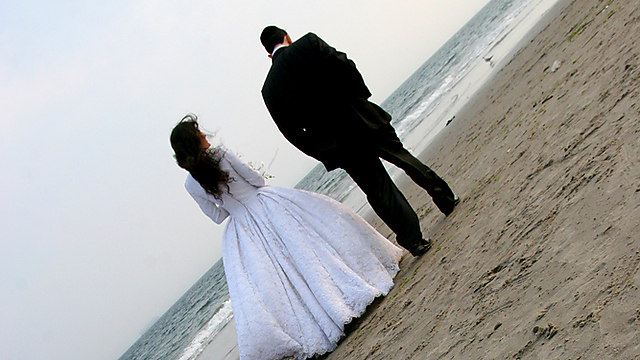
Expected progress towards civil unions not realized
Six years ago, Knesset passed law permitting civil unions for citizens without a recognized religion; rather than open the floodgates to civil marriage, the law has stagnated; some 300,000 Israelis have 'no religious affiliation' and are thus barred from marrying inside the country.
In 2010, the Knesset passed the Civil Union Law for Citizens with no Religious Affiliation 2010, and it was hailed as the harbinger of civil marriages for all Israelis; six years later, it can be declared a failure.
During 2016, only one couple chose to enter into a union under the auspices of the law. In the interim, hundreds of thousands of Israelis remain without a legal option to marry in their own country.
According to the Ministry of Justice's records, from 2011 until now, only 121 couples have taken advantage of the 2010 law—roughly 20 couples a year. The peak year was 2012 with 46 couples, and the rate has significantly decreased every since. A further 12 couples were rejected for failing to meet criteria. The data were presented by the NGO Hiddush for Religious Freedom and Equality for the UN's Human Rights Day on December 10.
Ever since the wave of immigration from the former Soviet Union in the 1990s, there have been multitudes of descendants of Jews who attained citizenship under the Law of Return but are not considered Jewish by the rabbinate, and by extension, the state. Demographists estimate that their number is on the rise with the second and third generations, reaching some 300,000. They are defined by the state as having "no religious affiliation" and cannot legally marry inside the country, be it in traditional Jewish weddings or in any other ceremony.
In recent years, many different attempts have been made to attain civil marriages for all Israelis, but the staunch opposition of the religious and Haredi parties caused all of them to fail, with the exception of the limited Union Law for Citizens with no Religious Affiliation, sponsored by Yisrael Beytenu. It permits couples of two partners both without religious affiliation to register their unions at the Ministry of Justice, and it refrains from calling their joining "marriage."
The principal claim that stood behind the bill and brought about limited change was that Israel was depriving the basic rates of 300,000 of its citizens by not offering them any avenue to have their relationships recognized. Contrary to those recognized as Jewish, who are permitted to wed under the auspices of the state rabbinate (whether they want to or not, as no other domestic legal option exists for them) and for those of other recognized faiths, who can marry within the legally recognized framework of their religion, those without religious affiliation had no real option.
The ultra-Orthodox had to compromise, which was authorized by then-Sephardic Chief Rabbi Shomo Amar: A new institution would be created within the Ministry of Justice, called the Couples' Registry. It would provide services to couples, but only after a rabbinical court issued an authorization that there was no fear that one of the two might be Jewish to ensure that no state-sponsored "mistakes" might take place. Regardless, the registered couple is not considered as married, and it is unclear what their status in other countries.
With the ultra-Orthodox parties able to veto any legislation by threatening to topple the government if it violates the status quo in the relationship between the state and religion, the situation is unlikely to change. The situation was the same in the previous government, even when Yesh Atid and the Bayit Yehudi put forward multiple proposals regarding these issues, the coalition had no hopes of promoting civil marriages.
Rabbi Uri Regev, Hiddush's president and CEO, commented on the data, "In light of the wide public support for civil marriages, it's time to erase artificial 'solutions' like (the Civil Union Law for Citizens with no Religious Affiliation) from the books and introduce in their place freedom of choice in marriage. We can only hope that Minister Lieberman, the leader of Yisrael Beytenu, who has expressed his support for civil marriage, will remember and bring up the vital need for it, even at cabinet meetings."











